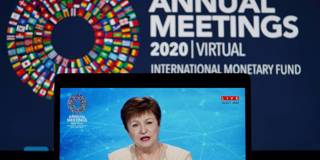Much of the conventional wisdom about how governments should manage the COVID-19 economic fallout is perfectly appropriate for advanced economies, but dangerous elsewhere. Even if developing and emerging economies could simply borrow and spend more to weather the storm, doing so could jeopardize their long-term economic prospects.
MILAN – Increased government spending during the pandemic is essential for managing public health, supporting households that have lost income, and preserving businesses that otherwise may fail and thus cause longer-term damage to output and employment. Kristalina Georgieva, the managing director of the International Monetary Fund, has urged policymakers to “spend but keep the receipts.” Likewise, World Bank Chief Economist Carmen M. Reinhart reminds us that, “first you worry about fighting the war, then you figure out how to pay for it.”
Although these are sound recommendations for countries with solid fiscal foundations, the long-term risks of increased spending may be dangerously high for others. In 2008, the Commission on Growth and Development (on which we both served) showed that successful developing countries owe their economic growth in part to the quality of their social and capital spending. And the most successful of these countries, we found, had run their economies with savings levels at or close to investment levels, such that their current account deficits were small.
Today, however, there are many countries – some that entered the pandemic already highly indebted – that have not been effective stewards of public resources, owing to poor project selection and implementation, ineffective targeting of social spending, wasteful subsidies, or outright corruption. Both the World Bank and the IMF have effective tools for measuring the quality of public spending, and there are a plethora of indices showing how well a country’s governance fares across standard benchmarks. For governments with a poor track record, simply borrowing and spending more may not be the best course of action.

MILAN – Increased government spending during the pandemic is essential for managing public health, supporting households that have lost income, and preserving businesses that otherwise may fail and thus cause longer-term damage to output and employment. Kristalina Georgieva, the managing director of the International Monetary Fund, has urged policymakers to “spend but keep the receipts.” Likewise, World Bank Chief Economist Carmen M. Reinhart reminds us that, “first you worry about fighting the war, then you figure out how to pay for it.”
Although these are sound recommendations for countries with solid fiscal foundations, the long-term risks of increased spending may be dangerously high for others. In 2008, the Commission on Growth and Development (on which we both served) showed that successful developing countries owe their economic growth in part to the quality of their social and capital spending. And the most successful of these countries, we found, had run their economies with savings levels at or close to investment levels, such that their current account deficits were small.
Today, however, there are many countries – some that entered the pandemic already highly indebted – that have not been effective stewards of public resources, owing to poor project selection and implementation, ineffective targeting of social spending, wasteful subsidies, or outright corruption. Both the World Bank and the IMF have effective tools for measuring the quality of public spending, and there are a plethora of indices showing how well a country’s governance fares across standard benchmarks. For governments with a poor track record, simply borrowing and spending more may not be the best course of action.